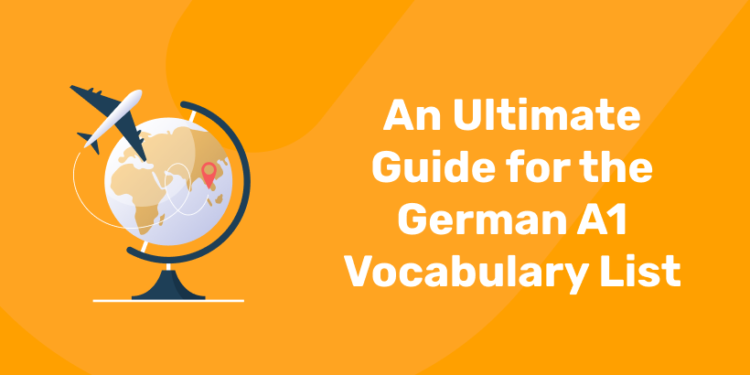Table of Contents
Introduction
Are you looking to enhance your proficiency in German? Well, there is no better stepping stone than completing the German A1 level. Daily nouns, common verbs, fundamental adjectives, adverbs, pronouns, and often-used phrases are all part of the foundational vocabulary that is covered at this level. You can communicate fundamental requirements, describe people, locations, and objects, and carry on simple conversations with the help of the A1 vocabulary list. You can handle commonplace scenarios like introducing oneself, asking for directions, and making simple requests if you can grasp these foundational words. In this article, we are providing an ultimate guide for the German A1 vocabulary list.
Click here to join the Entri online German language course! Watch demo classes here!
German A1 – Understanding The Basics
1: How do you say "Good Morning" in German?
This level introduces you to the basic vocabulary, which includes everyday nouns, verbs, adjectives, and phrases. The course will equip you to describe people, places, and things; communicate basic needs; and have simple discussions since simple sentence forms are emphasised. Furthermore important grammatical principles, including the usage of personal pronouns and fundamental verb conjugations are covered. Once these fundamentals are mastered, you will be able to navigate everyday situations such as self-introduction, direction-seeking, and basic request-making, providing a solid basis for future language learning.
Free German A1 Mock Tests – Powered by AI!
Test your skills on our interactive platform. Get instant feedback from our AI to help you communicate better and track your progress. Start your free German mock test now.
Test Your German A1 for FreeCharacteristics Of German A1 Vocabulary
The German A1 vocabulary is simple and puts emphasis on common language use. It contains high-frequency words and phrases that are necessary for fundamental communication, like adjectives (large, little, good, bad), verbs (to be, to have, to eat), and common nouns (family members, home things). Because the terminology is concrete and directly applicable to everyday life, you will find it simpler to retain and apply in real-world contexts. Simple sentence constructions that normally follow the subject-verb-object order help in the formation of sentences that are both straightforward and coherent. A1 vocabulary also incorporates fundamental grammatical rules, such as simple verb conjugations and personal pronouns, setting the groundwork for more advanced language proficiency.
German A1 Vocabulary List
1.Nouns
Basic Nouns For Addressing People
- der Mann (man): Refers to an adult male.
- die Frau (woman): Refers to an adult female.
- das Kind (child): Refers to a young person, typically under the age of 12.
- der Freund (friend, male): A male friend.
- die Freundin (friend, female): A female friend.
- die Familie (family): A group of related individuals, usually including parents and children.
Basic Nouns For Home And Objects
- das Haus (house): A building for human habitation.
- die Wohnung (apartment): A set of rooms forming an individual residence within a larger building.
- das Zimmer (room): An individual space within a house or apartment.
- die Küche (kitchen): A room where food is prepared and cooked.
- das Bett (bed): A piece of furniture for sleep or rest.
- der Tisch (table): A piece of furniture with a flat top and one or more legs.
- der Stuhl (chair): A seat typically having four legs and a back for one person.
Explore our free German language materials!
Basic Nouns For Food And Drink
- das Brot (bread): A staple food made from flour and water, usually baked.
- der Apfel (apple): A round fruit with red, green, or yellow skin.
- das Wasser (water): A clear, colorless, odorless, and tasteless liquid essential for life.
- der Tee (tea): A hot drink made by infusing dried leaves in boiling water.
- der Kaffee (coffee): A hot drink made from roasted and ground coffee beans.
- das Essen (food): Any nutritious substance that people eat or drink.
- die Milch (milk): A white liquid produced by mammals to feed their young.
Basic Nouns For Common Places
- die Schule (school): An institution for educating children.
- die Arbeit (work): A place where one is employed.
- der Park (park): A large public green area in a town or city.
- das Geschäft (store): A place where goods are sold to the public.
- der Supermarkt (supermarket): A large self-service store selling foods and household goods.
- das Krankenhaus (hospital): An institution providing medical and surgical treatment.
- die Straße (street): A public road in a city or town.
2. Verbs
Basic Verbs For Daily Activities
- sein (to be): Used to describe existence or a state of being.
- haben (to have): Used to indicate possession.
- essen (to eat): The act of consuming food.
- trinken (to drink): The act of consuming liquids.
- schlafen (to sleep): The act of resting with closed eyes. [Wir schlafen früh. (We sleep early.)]
- arbeiten (to work): The act of performing a job or task.
- lernen (to learn): The act of acquiring knowledge or skills.
- lesen (to read): The act of looking at and understanding written or printed material.
- kaufen (to buy)
- sprechen (to speak)
- reisen (to travel)
Basic Verbs For Movements
- gehen (to go): The act of moving from one place to another on foot.
- fahren (to drive/ride): The act of moving in a vehicle.
- laufen (to run): The act of moving rapidly on foot.
- kommen (to come): The act of moving towards a place.
- bleiben (to stay): The act of remaining in a place.
|
Preparing for German A2? – Download Free PDF with Excercises |
||
Basic Verbs For Common Actions
- machen (to do/make): The act of performing an action or creating something.
- nehmen (to take): The act of grasping or acquiring something.
- geben (to give): The act of transferring possession to someone.
- sehen (to see): The act of perceiving with the eyes.
- hören (to hear): The act of perceiving sound.
- finden (to find): The act of discovering something.
- fragen (to ask): The act of requesting information.
3. Adjectives
Basic Adjectives For Describing People And Objects
- gut (good): Positive quality or state.
- schlecht (bad): Negative quality or state.
- groß (big/tall): Larger in size or height.
- klein (small/short): Smaller in size or height.
- alt (old): Having lived for many years.
- jung (young): Having lived for a short time.
- schön (beautiful): Pleasing in appearance.
- hässlich (ugly): Unpleasant in appearance.
4. Adverbs
Basic Adverbs For Time and Frequency (Zeit und Häufigkeit)
- immer (always): At all times.
- oft (often): Frequently.
- manchmal (sometimes): Occasionally.
- selten (rarely): Infrequently.
- nie (never): At no time.
|
German Language Course in Different Cities |
5. Common Phrases
- Guten Morgen (Good morning): A greeting used in the morning.
- Guten Tag (Good day): A greeting used during the day.
- Guten Abend (Good evening): A greeting used in the evening.
- Gute Nacht (Good night): A farewell used at night.
- Wie geht’s? (How are you?): A question asking about someone’s well-being.
- Mir geht’s gut. (I am fine.): A response indicating one is well.
- Bitte (Please): A polite request or response.
- Danke (Thank you): An expression of gratitude.
- Entschuldigung (Excuse me/Sorry): Used to apologize or get attention.
6. Basic Pronouns
- ich (I): First person singular.
- du (you, informal): Second person singular, informal.
- er/sie/es (he/she/it): Third person singular.
- wir (we): First person plural.
- ihr (you all, informal): Second person plural, informal.
- sie (they): Third person plural.
- Sie (you, formal): Second person singular/plural, formal.
7. Basic Conjunctions
- und (and): Connects words or phrases.
- oder (or): Presents an alternative.
- aber (but): Introduces a contrast.
- weil (because): Introduces a reason.
- dass (that): Introduces a subordinate clause.
|
Goethe 2025 Exam Dates: Multiple Centers |
|
| Trivandrum Goethe Exam Dates | Kochi Goethe Exam Dates |
| Chennai Goethe Exam Dates | Coimbatore Goethe Exam Dates |
8. Basic Prepositions
- in (in): Indicates location within.
- auf (on): Indicates location on a surface.
- unter (under): Indicates location below.
- neben (next to): Indicates location beside.
- zwischen (between): Indicates location in the middle of two points.
- vor (in front of): Indicates location ahead.
- hinter (behind): Indicates location at the back.
- mit (with): Indicates accompaniment or association.
Example Sentences for Real Context:
-
Guten Morgen! (Good morning!)
-
Wo ist die Schule? (Where is the school?)
-
Ich möchte einen Apfel kaufen. (I would like to buy an apple.)
-
Wir lernen Deutsch. (We are learning German.)
-
Sie wohnen in einer Wohnung. (They live in an apartment.)
CONCLUSION
With a user-friendly approach and a clear framework, this ultimate German A1 Vocabulary List is perfect for beginners who want to create a strong foundation and confidently navigate through German basics. It is meant to help novices grasp the language at the A1 level. “Viel Erfolg und Spaß beim Lernen” (good luck and have fun learning)!
Curious about learning German more? Our German Language class is like a cozy gathering where you’ll learn essential vocabulary in a relaxed and enjoyable atmosphere. We focus on real-life conversations that make learning instilled onto you. Enrol now, and let’s make this language adventure a fun and memorable experience together!
Free German A1 Mock Tests – Powered by AI!
Test your skills on our interactive platform. Get instant feedback from our AI to help you communicate better and track your progress. Start your free German mock test now.
Test Your German A1 for FreeFrequently Asked Questions
What is A1 level German?
According to CEFR, attaining the A1 level German means you can, understand simple written texts, such as signs, and labels.
Can I get a job in Germany with A1 level?
If you are an EU citizen with German A1 you can directly work in several jobs.
Can I learn German in 2 months?
Language students who practice a method of complete immersion, with eight hours of practice per day, could learn German to a high level in a matter of months. Those who dedicate at least one hour per day to language learning can achieve an intermediate level within two years.
What career options are available in Germany?
Germany offers a wide range of career options across various industries.
- Software Developer
- Programmer
- civil Engineers and Architect
- IT consultant and Analyst
- Electronics Engineer
- Electrician and Electrical Fitter
- Economists and Business Management Expert
- customer Advisors and Account Management
- Production Assistant
- Sales Representatives and Assistant
- Sales and Product Managers
What are the fees of the German A1 exam?
The examination fee for A1 is roughly Rs.7000-Rs.8500 in India. After successfully passing the test, you will receive a certificate with your results five to six weeks after the examination.
Is A1 certificate enough for Germany?
Levels A1 and A2: These levels provide you with basic knowledge of the German language. If you have no previous knowledge, attending an A1 course is highly recommended.
How many words should I know for German A1?
Typically, 700–1,000 words are recommended for A1, covering topics like greetings, family, food, shopping, directions, and daily routines. Mastery of these words will enable you to manage most everyday conversations and foundational tasks.
What kind of vocabulary is included at A1 level?
A1 covers basic nouns (family, places, objects), common verbs, adjectives, simple adverbs, pronouns, prepositions, and everyday phrases used for greetings, introductions, requests, and describing people/objects.
Can I pass the Goethe A1 exam with this vocabulary list?
Yes—knowing A1 vocabulary is essential for the exam. However, you should also practice listening, reading, and writing exercises, familiarize yourself with the exam format, and learn simple grammar rules for best results.
How can I practice German A1 vocabulary effectively?
-
Take interactive quizzes (see our Practice section!),
-
Practice with sample sentences and roleplays,
-
Listen and repeat words using audio guides,
-
Try to use 5 new words in conversation every day.












